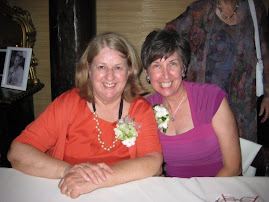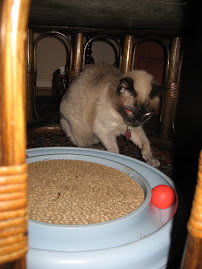
As we age, we unconsciously follow in our parents’ footsteps in so many ways. I have been fortunate to have had parents who served as good role models to me in almost every aspect of my life. My parents entered a wonderful retirement / continuing-care community at the ages of 89 and 93. After they had been there for one year (and coincidentally three months before my mother passed away), my mother requested that all of the siblings (her four children) come to their new home to participate with her and my dad in a one day workshop designed to help the “over 80 crowd” find meaning in their twilight years. None of us knew that my mother was so near the end of her life. She was a wise and somewhat sly woman. Somehow, in her wisdom or intuition, she knew that this would be a good way for us all to spend some meaningful and quality time together. As children, we took turns working with our parents on various assigned activitites. One of the most rewarding activities of that day was sitting with my father, helping him to recreate a timeline of his life. In particular, we looked at his life by decades, and reflected upon the major events and meaningful memories of his life as a husband, father and professional.
According to the workshop leader, instead of focusing on our aches and pains and all those things that our bodies may no longer be capable of doing, this is the time in our life to focus on our spiritual lives. If we are lucky enough to maintain our cognitive functioning, we can use this time for reflection and for examination of our inner life, something that we may have been too busy to spend much time with in the earlier years. More than once, after my dad began his physical decline when he was well into the latter part of his tenth decade, he kept asking us or wondering aloud, “I just wonder why God is keeping me alive. I wish I knew what the purpose is.”
My father was a hard worker, a highly respected man in the community, a very selfless person who would have considered it not only egotistical but a waste of time to spend time thinking about himself. What a pleasure it was to have those few hours to sit with him and to help him make a timeline of his life. It was hard for him because it just was not in his nature to focus on himself. I had to keep reminding him that God was keeping him with us so that he would have this time to be mindful of where he had made contributions; to look for patterns in his life; and to prepare himself for the life to come.
Dad had always liked to reminisce about growing up on the farm; about the sacrifices his family made by sending him to high school; about his life at the university when he worked on a dairy farm and also made the wrestling team. He told us how there was no time for fooling around on the farm and that his dad, my grandfather, never allowed any “monkey-business,” as he used to call it.
As we looked back on my dad’s life, it’s true that there was very little “monkey-business.” He was reminded of the many young men he had mentored as a 4-H leader; of the multitude of mutual acts of kindness and devotion he had shown to and received from his own four children and 5 grandchildren; and of the love of his wife for 60 years. My dad never expected anything in return for all he did to help his family, friends and community. There was no doubt to me that the world was a better place because of his presence. Of course, in his typically modest way, he never acknowledged any of this to me or to anyone. But, in my heart, I like to think that he got a glimpse of his real value and that he took time to be thankful for his own gifts.
If you are wondering how to spend that empty day in your retirement, why not try the same exercise? Map out your life in decades. Ask yourself what were the formative experiences of those decades that helped make you who you are today. You will probably laugh, cry and be astonished at all the marvelous memories that come flooding back.
According to the workshop leader, instead of focusing on our aches and pains and all those things that our bodies may no longer be capable of doing, this is the time in our life to focus on our spiritual lives. If we are lucky enough to maintain our cognitive functioning, we can use this time for reflection and for examination of our inner life, something that we may have been too busy to spend much time with in the earlier years. More than once, after my dad began his physical decline when he was well into the latter part of his tenth decade, he kept asking us or wondering aloud, “I just wonder why God is keeping me alive. I wish I knew what the purpose is.”
My father was a hard worker, a highly respected man in the community, a very selfless person who would have considered it not only egotistical but a waste of time to spend time thinking about himself. What a pleasure it was to have those few hours to sit with him and to help him make a timeline of his life. It was hard for him because it just was not in his nature to focus on himself. I had to keep reminding him that God was keeping him with us so that he would have this time to be mindful of where he had made contributions; to look for patterns in his life; and to prepare himself for the life to come.
Dad had always liked to reminisce about growing up on the farm; about the sacrifices his family made by sending him to high school; about his life at the university when he worked on a dairy farm and also made the wrestling team. He told us how there was no time for fooling around on the farm and that his dad, my grandfather, never allowed any “monkey-business,” as he used to call it.
As we looked back on my dad’s life, it’s true that there was very little “monkey-business.” He was reminded of the many young men he had mentored as a 4-H leader; of the multitude of mutual acts of kindness and devotion he had shown to and received from his own four children and 5 grandchildren; and of the love of his wife for 60 years. My dad never expected anything in return for all he did to help his family, friends and community. There was no doubt to me that the world was a better place because of his presence. Of course, in his typically modest way, he never acknowledged any of this to me or to anyone. But, in my heart, I like to think that he got a glimpse of his real value and that he took time to be thankful for his own gifts.
If you are wondering how to spend that empty day in your retirement, why not try the same exercise? Map out your life in decades. Ask yourself what were the formative experiences of those decades that helped make you who you are today. You will probably laugh, cry and be astonished at all the marvelous memories that come flooding back.








